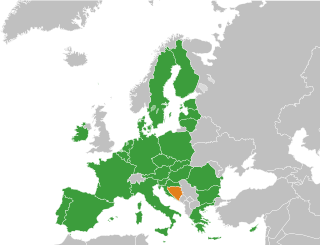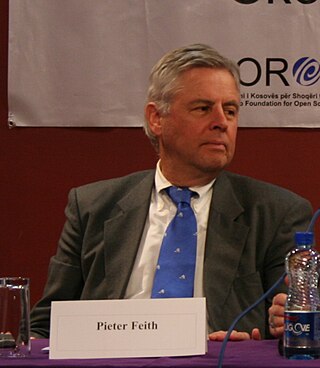
The United Nations Interim Administration Mission in Kosovo is the officially mandated mission of the United Nations in Kosovo. The UNMIK describes its mandate as being to "help the United Nations Security Council achieve an overall objective, namely, to ensure conditions for a peaceful and normal life for all inhabitants of Kosovo and advance regional stability in the Western Balkans."

Martti Oiva Kalevi Ahtisaari was a Finnish politician, the tenth president of Finland, from 1994 to 2000, a Nobel Peace Prize laureate, and a United Nations diplomat and mediator noted for his international peace work.

The Kosovo Force (KFOR) is a NATO-led international peacekeeping force in Kosovo. Its operations are gradually reducing until Kosovo's Security Force, established in 2009, becomes self-sufficient.
The politics of Kosovo takes place in a framework of a multi-party parliamentary representative democratic republic, whereby the President (Presidenti) is the head of state and the Prime Minister (Kryeministri) the head of government. Parliamentary elections are held every four years, the most recent in 2021.

The High Representative for Bosnia and Herzegovina, together with the Office of the High Representative (OHR) in Bosnia and Herzegovina, were created in 1995 immediately after the signing of the Dayton Agreement which ended the 1992–1995 Bosnian War. The purpose of the High Representative and the OHR is to oversee the civilian implementation of the Dayton agreement. They also serve to represent the countries involved in the implementation of the Dayton Agreement through the Peace Implementation Council (PIC), which chooses the High Representative.
The European Union Special Representatives (EUSR) are emissaries of the European Union with specific tasks abroad. While the EU's ambassadors are responsible for affairs with a single country, Special Representatives tackle specific issues, conflict areas or regions of countries. They answer directly to the High Representative of the Union for Foreign Affairs and Security Policy, currently Josep Borrell.

United Nations Security Council resolution 1244, adopted on 10 June 1999, after recalling resolutions 1160 (1998), 1199 (1998), 1203 (1998) and 1239 (1999), authorised an international civil and military presence in the Federal Republic of Yugoslavia and established the United Nations Interim Administration Mission in Kosovo (UNMIK). It followed an agreement by Yugoslav President Slobodan Milošević to terms proposed by President of Finland Martti Ahtisaari and former Prime Minister of Russia Viktor Chernomyrdin on 8 June, involving withdrawal of all Yugoslav state forces from Kosovo.
The political status of Kosovo, also known as the Kosovo question, is the subject of a long-running political and territorial dispute between the Serbian government and the Government of Kosovo, stemming from the breakup of Yugoslavia (1991–92) and the ensuing Kosovo War (1998–99). In 1999, the administration of the Autonomous Province of Kosovo and Metohija was handed on an interim basis to the United Nations under the terms of UNSCR 1244 which ended the Kosovo conflict of that year. That resolution reaffirmed the territorial integrity of Serbia over Kosovo but required the UN administration to promote the establishment of 'substantial autonomy and self-government' for Kosovo pending a 'final settlement' for negotiation between the parties.

The Constitution of Kosovo is the supreme law of the Republic of Kosovo, a territory of unresolved political status. Article four of the constitution establishes the rules and separate powers of the three branches of the government. The unicameral Assembly of the Republic exercises the legislative power, the executive branch led by the President and the Prime Minister which are responsible for implementing laws and the judicial system headed by the Supreme Court.

The accession of Bosnia and Herzegovina to the European Union (EU) is the stated aim of the present relations between the two entities. Bosnia and Herzegovina has been recognised by the European Union as a "candidate country" for accession since the decision of the European Council in 2022 and is on the current agenda for future enlargement of the EU. Bosnia and Herzegovina takes part in the Stabilisation and Association Process and trade relations are regulated by an Interim Agreement.

The European Union Rule of Law Mission in Kosovo, known as EULEX Kosovo or simply as EULEX, is the largest civilian mission ever launched under the Common Security and Defence Policy (CSDP) of the European Union. EULEX supports selected Kosovo rule of law institutions on their path towards increased effectiveness, sustainability, multi-ethnicity and accountability, free from political interference and in full compliance with international human rights standards and best European practices.
The 2008 Kosovo declaration of independence, which proclaimed the Republic of Kosovo to be a state independent from Serbia, was adopted at a meeting held on 17 February 2008 by 109 out of the 120 members of the Assembly of Kosovo, including the Prime Minister of Kosovo, Hashim Thaçi, and by the President of Kosovo, Fatmir Sejdiu. It was the second declaration of independence by Kosovo's Albanian-majority political institutions; the first was proclaimed on 7 September 1990.

Pieter Cornelis Feith is a Dutch diplomat, formerly serving as the European Union Special Representative (EUSR) and as the International Civilian Representative in Kosovo.

The 2008 unrest in Kosovo followed Kosovo's declaration of independence on February 17, 2008. Some Kosovo Serbs opposed to secession boycotted the move by refusing to follow orders from the central government in Pristina and attempted to seize infrastructure and border posts in Serb-populated regions. There were also sporadic instances of violence against international institutions and governmental institutions, predominantly in North Kosovo.
The International Steering Group for Kosovo (ISG) was an organization formed pursuant to the Ahtisaari Plan concerning the Kosovo status process. Made up of countries that recognized the declaration of independence, it was set up to guide Kosovo's democratic development and promote good governance, multi-ethnicity and the rule of law.

The accession of Kosovo to the European Union (EU) is on the current agenda for future enlargement of the EU. Kosovo is currently recognized by the EU as a potential candidate for accession.
The Ahtisaari Plan, formally the Comprehensive Proposal for the Kosovo Status Settlement (CSP), is a status settlement proposed by former President of Finland Martti Ahtisaari covering a wide range of issues related to the status of Kosovo.

France–Kosovo relations are the bilateral relations between the French Republic and the Republic of Kosovo. When Kosovo declared its independence from Serbia on 17 February 2008, France became one of the first countries to announce officially about recognition of sovereign Kosovo. France has an embassy in Pristina. Kosovo has an embassy in Paris. The two countries enjoy very good and friendly relations.

The Cathedral church of Christ the Saviour in Pristina, Kosovo is an unfinished Serbian Orthodox Christian church whose construction began in 1992. Due to have been completed in 1999, its construction, on the campus of the pre-war University of Pristina, was interrupted by the Kosovo War.

Kosovo has a civil law system which is also sometimes known as the Continental European law system. The central source of law that is recognized as authoritative is codifications in a constitution or statute passed by legislature, to amend a code. This system of Kosovo has experienced several changes throughout the years and is currently a system that includes prominent bodies and branches that help Kosovo enact adequate laws and conduct proper legal procedures.
















